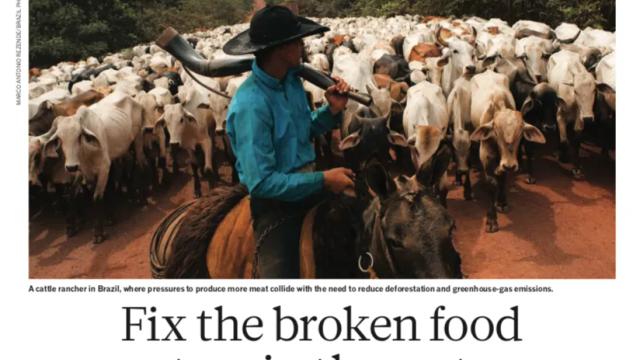Fixing a Broken Food System
In a comment in Nature , researchers lay out a solution for climate change and food security that draws on an integrated view of agriculture, biodiversity, trade, and nutrition.
The current food production system fails to meet the needs of the current population, while causing major impacts to the environment. Taking an integrated view of these problems shows the way towards policies to change the system, according to a new comment published in the journal Nature by researchers at IIASA and the UN Sustainable Development Solutions Network (SDSN)
“Threats to agriculture, climate and health are entwined. Yet policies treat each in isolation and are misaligned,” write the authors, which included SDSN Executive Director Guido Schmidt-Traub, IIASA Ecosystems Services and Management Program Director Michael Obersteiner; and IIASA Researcher and SDSN Scientific Director Aline Mosnier.
Schmidt-Traub says, “The commentary lays out three key areas for policymakers to focus on to help create effective integrated food policy. We suggest that the integrated solution strategies should be organized along three principle pillars: Efficient and resilient agricultural systems; conservation and restoration of biodiversity, and food security and healthy diets.”
“There are competing priorities across these pillars,” explains Obersteiner, “and countries need systems analysis tools to better assess synergies and trade-offs when making policy choices concerning the food system.”
The article draws on findings from the SDSN’s Deep Decarbonization Pathways Project , and in-depth country policy support projects for food and land-use carried out by IIASA. To support countries to jointly work towards the SDGs, both organizations have launched a policy-science co-design project under the title " Food, Agriculture, Biodiversity, Land-Use and Energy(FABLE)."
“In practice, an integrated food policy would include changes in agricultural practices, shifting diets and production from meat towards more fruit and vegetables, as well as technological improvements in farming that minimize environmental impact (such as drip irrigation), and methods to allow increased yield on smaller amounts of land,” says Aline Mosnier, the Scientific Director of the FABLE Consortium.
Projects such as FABLE support policymakers with the tools to anticipate impacts across sectors, and design more integrated and effective agricultural, health and environmental policies.
Reference
Schmidt-Traub G, Obersteiner M, & Mosnier A (2019). Fix the broken food system in three steps. Nature 569, 181-183. doi: 10.1038/d41586-019-01420-2
More info/Links
http://www.iiasa.ac.at/web/home/research/researchPrograms/EcosystemsServicesandManagement/event/170403-fable.html
https://www.unsdsn.org/fable
https://www.foodandlandusecoalition.org/global-initiatives/fable/
Contacts:
Researcher contact
Michael Obersteiner
Program Director
Ecosystems Services and Management
Tel: +43(0) 2236 807 460
oberstei@iiasa.ac.at
Researcher contact
Guido Schmidt-Traub
Executive Director
SDSN
Tel: +33 1 84 86 06 63
guido.schmidt-traub@unsdsn.org
Press Officer
Ansa Heyl
IIASA Press Office
Tel: +43 2236 807 574
Mob: +43 676 83 807 574
heyl@iiasa.ac.at
About IIASA:
The International Institute for Applied Systems Analysis (IIASA) is an international scientific institute that conducts research into the critical issues of global environmental, economic, technological, and social change that we face in the twenty-first century. Our findings provide valuable options to policymakers to shape the future of our changing world. IIASA is independent and funded by prestigious research funding agencies in Africa, the Americas, Asia, and Europe. www.iiasa.ac.at
About SDSN:
The UN Sustainable Development Solutions Network (SDSN) mobilizes scientific and technical expertise from academia, civil society, and the private sector to support practical problem-solving for sustainable development at local, national, and global scales. The SDSN has been operating since 2012 under the auspices of the UN Secretary-General. The SDSN is building national and regional networks of knowledge institutions, solution-focused thematic networks, and the SDG Academy , an online university for sustainable development. https://www.unsdsn.org/
